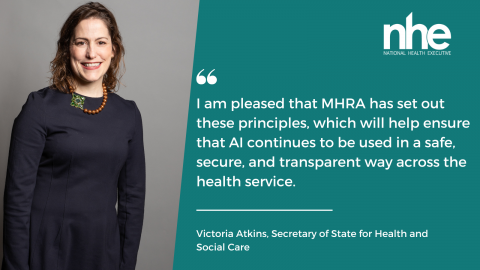The Medicines and Healthcare products Regulatory Agency (MHRA) has set out its strategic approach to artificial intelligence (AI) to ensure both patient safety and industry innovation.
The MHRA has taken a number of steps over the past 12 months to implement the recommendations set out in last year’s government whitepaper on AI regulation.
This work is based on a range of principles, including:
- Safety, security and robustness
- Appropriate transparency and explainability
- Fairness
- Accountability and governance
- Contestability and redress

The MHRA is looking to help cement the UK’s place as a science and technology superpower by 2030. The MHRA is considering the opportunities and risks of AI from three perspectives, which are:
- As a regulator of AI products
- As a public service organisation delivering time-critical decisions
- As an organisation that makes evidence-based decisions that impact on public and patient safety, where that evidence is often supplied by third parties
The MHRA’s chief quality and access officer, Dr Laura Squire, said: “AI offers us the opportunity to improve the efficiency of the services we provide across all our regulatory functions from regulatory science, through enabling safe access for medicines and medical devices, to post market surveillance and enforcement.”
The improved efficiencies will not only allow patients earlier access to safe medical products, but it will also enable the MHRA to cast a wider focus on innovation and patient engagement.
The agency expects its processes and protocols – submission consideration, premise inspections, data examination etc. – to evolve in line with innovative AI.
The MHRA is already in the process of implementing its own reform through The Regulation of Artificial Intelligence as a Medical Device programme.
The MHRA says that its partnerships with the International Medical Devices Regulators Forum, and in particular the US Food and Administration, and Health Canada, will keep the agency at the forefront of international best practice.
Laura added: “Increasingly, we expect AI to feature in how those we regulate undertake their activities and generate evidence and we therefore need to ensure we understand the impact of that in order to continue to regulate effectively.”
Image credit: iStock



















